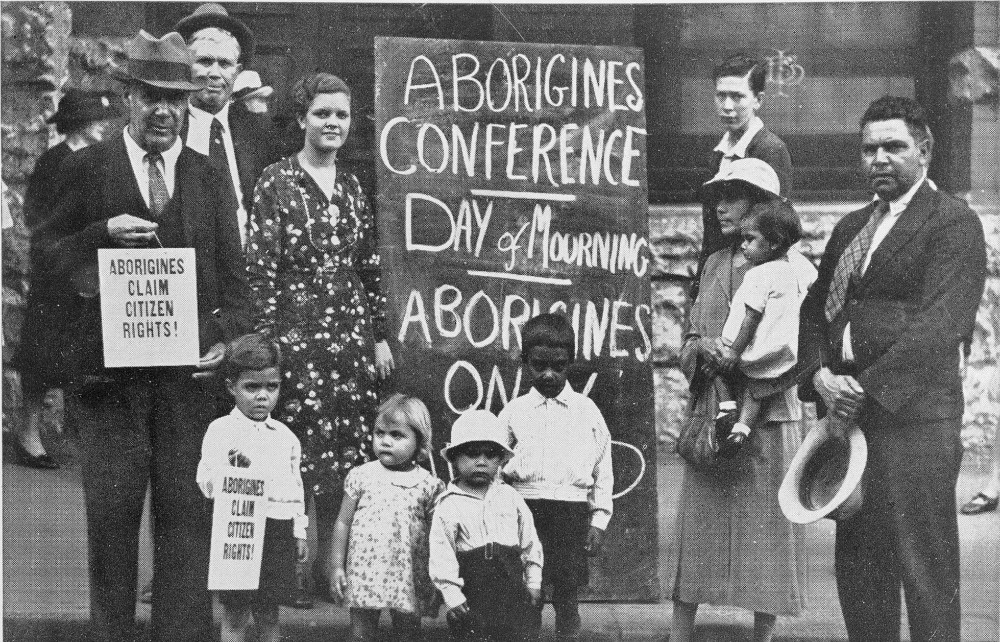In a sermon for Aboriginal Sunday (a name for the Sunday before January 26), Kanishka Raffel, the Anglican Archbishop of Sydney, honoured the work of William Cooper, a Christian First Nations man who called the Aboriginal people to observe a day of mourning on January 26 1938, the 150th anniversary of the first fleet landing. In the sermon he covers the topic of intergenerational sin, why we need to make right sins tfrom th past that affect the present.
“In the late 1930s, William Cooper, an Aboriginal Christian leader and Yorta Yorta man, called on the national churches to set aside the Sunday before Australia Day to pray for the spread of the gospel among his people and the improvement of their social conditions and welfare. Today, many churches across Australia are answering that call.”
“As Australia prepared to celebrate the sesquicentenary of British settlement, Cooper – who was Secretary of the Australian Aborigines League – along with the Aborigines Progressive Association, arranged a Day of Mourning on January 26 which was held at Australian Hall in Elizabeth Street, Sydney. It was the first time Aboriginal people gathered from around Australia to advocate for the welfare of their own people. This followed on from the Australian Government’s rejection of a petition drafted by Cooper and addressed to the King, seeking among other things, Aboriginal representation in the Federal Parliament.
“At roughly the same time, Cooper called on the churches of Australia to mark what he called ‘Aborigines Sunday’ on the Sunday before Australia Day. He was supported by John Stafford Needham, Honorary Canon of this Cathedral, whose plaque (on the northern wall) describes him as ‘Priest, Missionary, and Friend to the Aborigines’,
“In calling on the churches of Australia to mark the Sunday before Australia Day in this way, Cooper said: ‘We request that sermons be preached on this day dealing with the Aboriginal people and their need of the gospel and response to it and we ask that special prayer be invoked for all missionary and other effort for the uplift of the dark people.’”
The first “Day of Mourning” was an Aboriginal only affair (see picture) held at Australian Hall in Elizabeth Street Sydney, now regarded as an historic site and owned by the Indigenous Land Corporation. The Aboriginal protestors were allowed to rent the hall on condition they watched the sesquicentennial parade from the Town Hall steps and then marched to the Australian Hall. where they were guarded by police.
In effect the 100 attendees at the Day of Mourning was a prototype “Voice”. It issued a manifesto: “WE, representing THE ABORIGINES OF AUSTRALIA, assembled in conference at the Australian Hall, Sydney, on the 26th day of January 1938, this being the 150th Anniversary of the Whiteman’s seizure of our country, HEREBY MAKE PROTEST against the callous treatment of our people by the whitemen during the past 150 years, AND WE APPEAL to the Australian nation of today to make new laws for the education and care of Aborigines, and we ask for a new policy which will raise our people to FULL CITIZEN STATUS and EQUALITY WITHIN THE COMMUNITY”
Kanishka Raffel calls Christians to reflect on history, to acknowledge sin, but also points to the blood of Christ as an answer to bloodshed.
“So as we prepare to celebrate Australia Day on Thursday, and to thank God for the beautyand bounty of this country, we want today to pause to acknowledge and lament the unhappy and devastating impact of European settlement on the lives of countless numbers of First Nations people, and also to thank God for the courage and faith and survival of thefirst Australians, so many of whom are our Christian brothers and sisters, who offer to us an invitation to walk together in humility and hope, forgiveness and reconciliation.
“Genesis chapter 4 tells the story of the first murder. Eve’s first born son, Cain murders hisbrother, Abel. The Lord inquires of Cain as to Abel’s whereabouts, to which Cain replies – notoriously – ‘Am I my brother’s keeper?’ Of course, Cain condemns himself since God does indeed intends that we should honour one another as fellow creatures made in God’s image.
“The Lord responds in these rather startling words in Genesis 4:10 ‘What have you done? The voice of your brother’s blood is crying to me from the ground.’
Raffel adds “The next time the Scriptures make reference to the blood of Abel, it is from the lips of Jesus.
“As he pronounces his ‘woes’ or judgements on the hypocrisy of the Pharisees and the teachers of the law in Matthew 23 he says to them: you testify against yourselves that you are the descendants of those who murdered the prophets… upon you will come all the righteous blood that has been shed on earth, from the blood of righteous Abel to the blood of Zechariah son of Berekiah, whom you murdered between the temple and the altar. Truly I tell you, all this will come on this generation. (v31-36)
“Somewhat surprisingly, Jesus teaches that those who oppose him in his day will be held accountable for the murder of the prophets who preceded him, who were killed by their ancestors. So, at least, we must not be too hasty to assure ourselves that we are utterly free of the sins of others in times past. Jesus speaks of intergenerational responsibility for some sins, and the Bible speaks of the intergenerational impact of some sins.”
Kanishka Raffel’s sermon, well worth reading in full is here. It also tells the story of Cooper leading the only citizens’ protest after Kristallnacht.
Image: The blackboard outside Australian Hall on the first day of mourning Updated to correct Kanishka Raffel’s name

